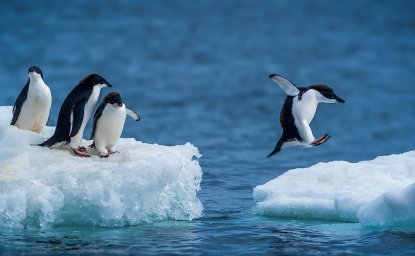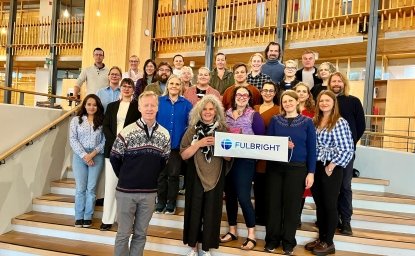
A blog of the Polar Institute
Dear colleagues,
I am delighted to introduce the Polar Institute’s new initiative, the US Polar Leadership Project. Intended to raise awareness of the importance of US leadership at a crucial juncture for both the Arctic and Antarctica, USPLP will will argue forcefully for the importance of US leadership via a multiyear program spotlighting the necessity and benefits of engagement in the poles.
The next few years are critically important to build support for US leadership, as we prepare for the upcoming US Chairship of the Arctic Council (2031-33) and International Polar Year (2032-33). The US must be ready to meet the moment and deliver on strategic priorities.
These milestones come at a time when the polar regions are under increasing scrutiny as loci of geopolitical pressure, whether from environmental changes, economic interests, evolving sovereignty considerations, or diplomatic signaling. The international agreements and organizations that represent the polar regions, including the Arctic Council and Antarctic Treaty System, are increasingly under pressure from efforts to undermine the global rules-based order.
Polar science is essential to understanding global environmental change, with consequences for global climate, biodiversity and human societies. The polar regions are intimately connected with the rest of the globe through water, energy, and carbon cycles. Rapid change in the polar regions threatens the US with rising sea levels and more severe natural disasters, as well as impacts to economic, environmental, and cultural values.
Arctic and Antarctic research is key to understanding change and to developing sound domestic and foreign policy. In this context, major international science bodies have called for a fifth International Polar Year (IPY) in 2032-33. The IPY will provide, according to the International Arctic Science Committee (IASC) and the Scientific Committee on Antarctic Research (SCAR), a vital opportunity to close outstanding major knowledge gaps.
The IPY will also coincide with the next US chairship of the Arctic Council (AC), which will occur 2031-33. During the two-year AC chairship, US agencies will be leading a suite of activities with federal, state, Indigenous, and international partners. In addition, the United States will be hosting a number of Arctic Council activities. United States engagement with both the International Polar Year and Arctic Council Chairship will require significant advance planning and coordination among federal agencies, and with international partners (with a particular emphasis on Canada as the chair from 2029-2031) to ensure that the US prepares and sustains a leadership role.
During this period, US leadership in the poles will be more important—and more closely scrutinized—than ever before. And our ability to demonstrate leadership, and to exert the influence of our presence in the Arctic and Antarctica—is on thin ice. Key capabilities and platforms that enable our presence in the poles are at risk. Flat or declining budgets will strain to accommodate the additional effort required for the Arctic Council chairship and IPY5, and all the associated events, programs, and engagements. But these years will also be an excellent time to launch new initiatives, platforms, and capabilities for maximum visibility and effect. It’s time to start now.
We look forward to working closely with our partner agencies to leverage strength in numbers and articulate a powerful and timely message. Please join our mailing list and follow us on social media to keep abreast of new programs and content.
Rebeca Pincus
Director of the Polar Institute
Author


Polar Institute
Since its inception in 2017, the Polar Institute has become a premier forum for discussion and policy analysis of Arctic and Antarctic issues, and is known in Washington, DC and elsewhere as the Arctic Public Square. The Institute holistically studies the central policy issues facing these regions—with an emphasis on Arctic governance, climate change, economic development, scientific research, security, and Indigenous communities—and communicates trusted analysis to policymakers and other stakeholders. Read more

Explore More in Polar Points
Browse Polar Points
US Polar Leadership Project

Greenland’s New Governing Coalition Signals Consensus


